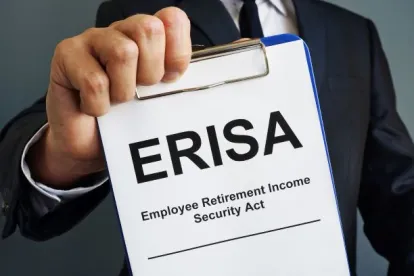Deadlines are an inescapable aspect of administering employee benefits plans, and even in the midst of a pandemic that seems to have slowed the progress of days to a crawl, time is always in short supply. Fortunately, the U.S. Department of Labor (DOL), with a bit of help from its friends at the U.S. Department of the Treasury, the Internal Revenue Service (IRS), and the U.S. Department of Health and Human Services (HHS), has come to the rescue with broad compliance relief for Employee Retirement Income Security Act (ERISA)-covered plans.
On April 29, 2020, the DOL’s Employee Benefits Security Administration (EBSA) issued EBSA Disaster Relief Notice 2020-01 and, in conjunction with the Treasury Department/IRS and HHS, final tax and labor regulations that extend many of the recurring statutory and regulatory deadlines that apply to retirement and group health plans. This relief first applies to actions or filings beginning March 1, 2020 (i.e., the date on which the Trump administration formally declared a national emergency relating to COVID-19) and continues until 60 days after the end of the COVID-19 national emergency or such other date specified by the DOL (otherwise known as the “Outbreak Period”). The DOL guidance follows on the heels of IRS Notice 2020-23, which extended various tax-related deadlines affecting retirement and welfare benefit plans.
Plan Disclosures and Participant Notices: Expanding to Electronic Delivery
In broad terms, EBSA Disaster Relief Notice 2020-01 applies to disclosures and notices for plan participants and beneficiaries required to be furnished by Title I of ERISA or otherwise under the DOL’s jurisdiction. Despite the breadth of the relief provided by the notice, fiduciaries are not given a free pass on their responsibilities under ERISA. Instead, the notice states that plan fiduciaries are still required to act in good faith and furnish all required disclosures and notices as soon as administratively practicable under the circumstances.
But in a significant nod to the increasing prevalence of electronic communications in benefit plan administration, the DOL clarifies that a “good faith” attempt to deliver required communications can be made via electronic means (including electronic mail, text messaging, or continuously available websites) where the plan fiduciary reasonably believes that the intended recipients will have ready access to the electronic communication. This approach offers welcome relief for plan sponsors from the DOL’s often-cumbersome existing rules for electronic disclosures and communications.
Plan Loans and Distributions
As we discussed in a previous article, the Coronavirus Aid, Relief, and Economic Security (CARES) Act offers new opportunities and flexibility for retirement plan loans and distributions relating to COVID-19 mitigation efforts. EBSA Disaster Relief Notice 2020-01 bolsters these new options by temporarily excusing procedural failures by a plan administrator in overseeing the loan and distribution process where the failure is solely attributable to the COVID-19 outbreak and where the administrator makes a good-faith diligent effort to comply and takes reasonable steps to correct the failures as soon as administratively practicable. Of note, this relief is specifically limited to verification requirements under Title I of ERISA and does not apply to any statutory or regulatory requirements enforced by the IRS. Since retirement plan loans and distributions are subject to extensive and overlapping regulation by the IRS, this is a significant caveat.
Regarding the expanded plan loan provisions permitted by the CARES Act—which were not incorporated into ERISA—EBSA Disaster Relief Notice 2020-01 clarifies that ERISA’s requirements that loans be adequately secured and made available on a reasonably equal basis are effectively waived for any loans made to qualified individuals. Specifically, the DOL stated in the notice that it “will not treat any person as having violated the provisions of Title I of ERISA … solely because: (1) the person made a plan loan to a qualified individual during the loan relief period in compliance with the CARES Act and the provisions of any related IRS notice or other published guidance; or (2) a qualified individual delayed making a plan loan repayment in compliance with the CARES Act and the provisions of any related IRS notice or other published guidance.”
Under the CARES Act, “qualified individuals” include individuals who:
-
are diagnosed with COVID-19;
-
have a family member who is diagnosed with COVID-19; or
-
experience a financial hardship relating to a layoff, reduced working hours, or other IRS-specified events relating to COVID-19) in accordance with applicable IRS guidance.
Plan sponsors generally have until the end of 2022 (for plans operating on a calendar-year basis) to formally adopt any amendments needed to implement mandatory or optional provisions of the CARES Act for their retirement plans. EBSA Disaster Relief Notice 2020-01 harmonizes the DOL’s approach by clarifying that the DOL will regard any retirement plan amendments adopted in compliance with the CARES Act to have been timely adopted as well.
EBSA Disaster Relief Notice 2020-01 also addresses one of the perennial compliance issues faced by the sponsors of 401(k) retirement plans: the timeliness of remittances of employee contributions and loan payments. The DOL has long taken the position that employee contributions and loan payments must be segregated from the plan sponsor’s general assets as soon as possible (i.e., generally within one to five days following the date on which withheld from pay) and audits this issue with great enthusiasm. In recognition of the fact that the current environment may complicate many plan sponsors’ usual payroll procedures, EBSA Disaster Relief Notice 2020-01 indicates that the DOL will temporarily excuse—“solely on the basis of a failure attributable to the COVID-19 outbreak”—tardy transfers of employee contributions and loan payments, provided the plan fiduciaries and vendors act reasonably, prudently, and in the best interests of plan participants to comply as soon as practicable.
Blackout Notice: Excusal of Delays
A relatively common feature of retirement plan administration is the “blackout period,” a period of three or more consecutive business days when, due to some sort of administrative transition (e.g., a change in investment funds or vendor relationships), participants’ ability to request loans or distributions or make changes to investment elections is limited. Under ERISA, the plan sponsor generally must provide at least 30 days’ advance notice to impacted participants prior to the start date for a blackout period, except where circumstances beyond the sponsor’s control force a shorter notice period.
Recognizing the limits of fiduciary authority, EBSA Disaster Relief Notice 2020-01 states that “pandemics are by definition beyond a plan administrator’s control” and that a delayed blackout notification attributable to the COVID-19 outbreak will, therefore, be excused during the relief period provided, even without the corresponding written determination by a plan fiduciary that ERISA otherwise requires. As with other notification relief, the DOL expects fiduciaries to act in good faith to provide the blackout notice as soon as administratively practicable in the circumstances.
EBSA Disaster Relief Notice 2020-01 does not create additional relief from the impending deadlines for annual reporting for ERISA plans (including both the Form 5500 and, for multiple employer welfare arrangements, the Form M-1) but instead refers to previous DOL and IRS guidance as outlined in IRS Notice 2020-23.
Additional Extensions and Forthcoming Guidance
The final regulations issued jointly by the DOL and the Treasury Department extend many common deadlines applicable to group health plans; the extension periods are identical to those outlined in EBSA Disaster Relief Notice 2020-01. In particular, the regulations—which are scheduled to be published on May 4, 2020, in the Federal Register—extend the following deadlines until the end of the Outbreak Period:
-
The special enrollment window applicable under the Health Insurance Portability and Accountability Act for enrolling new dependents in group health plans
-
The deadline by which employers and plan administrators must provide continuing health coverage election forms under the Consolidated Omnibus Budget Reconciliation Act of 1985 (COBRA)
-
The 60-day election period for enrollment in COBRA continuation coverage
-
The due dates for COBRA premiums
-
The deadline for notifying a plan administrator of certain COBRA-qualifying events such as a divorce or a disability determination
-
The deadline for submitting a benefit claim for review or an appeal of a claim denial
-
The deadlines for submitting a request for external review or additional information to perfect a request for external review of a denied group health appeal
It is likely that additional guidance on these and other administrative and compliance issues for employee benefit plans will be forthcoming from the Treasury Department, the IRS, and the DOL. For now, the extensions offered by EBSA Disaster Relief Notice 2020-01 and the related final tax and labor regulations should offer much-needed relief to plan sponsors and fiduciaries as they navigate the challenging business environment presented by the COVID-19 pandemic.





 />i
/>i

